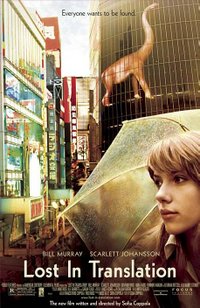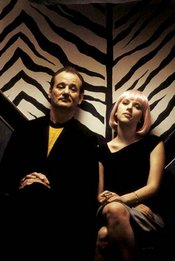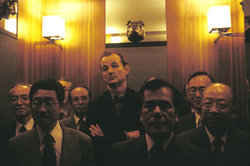Lost in Translation
Lost in Translation is a (2003) motion picture. It was the second writing and directorial effort of Sofia Coppola, after The Virgin Suicides. more...
Tagline: Everyone wants to be found.
Synopsis
On its surface, Lost in Translation is a movie about culture shock between East and West, yet this reveals itself as a metaphor for more important themes of alienation and loneliness, and alternatively companionship. The film explores how these themes combine at certain stages in life, against the background of highly modern Japanese cityscapes.
Bob Harris (played by Bill Murray), is an American movie star on the downward slope of his career who has come to Tokyo, Japan, to film a Suntory whisky commercial (a reference to real-life Hollywood actors who have done similar deeds). His marriage has cooled off decidedly—his wife contacts him frequently, not to actually talk to him, but to get his opinion on carpet samples or to remind him that he forgot his son's birthday. Harris finds himself in a city and culture beyond his comprehension for reasons that he has trouble remembering. It's only the solace of a big paycheck that has brought him to the foreign land but with the feeling that he's selling himself out for a quick buck instead of acting. Scarlett Johansson is Charlotte, a recent philosophy graduate of Yale University, the wife of a Rolling Stone-type photographer (Giovanni Ribisi) on assignment in Tokyo. As both a hanger-on and a left-behind, she begins to wonder where she is and what she is doing, and who the man that she married really is. Her husband has more time for his work and young starlets (e.g., Anna Faris' Kelly) than for her. Bob and Charlotte, both lonely, lost, and sleepless, happen upon each other in the lounge of the hotel where they are staying (the Park Hyatt Tokyo) and strike up an unusual friendship.
Drawn together by their mutual dissatisfaction and alienation, the two experience the stranger side of Tokyo nightlife, playfully exploring the foreign city, and finding comfort in relating to each other when nothing else in their lives seems to fit. Against the expected movie stereotype of man meets woman, the friendship is denied the chance to bloom into romance, and yet their fleeting time together makes a strong impression on both characters.
In the end, some critics say the film is a delicately nuanced look at the mechanics of verbal and emotional miscommunication, igniting a spark of common humanity and yearning at the intersection between a mid-life and a quarter-life crisis. Slyly appealing to Baby Boomers as much as Generation X-ers, Lost in Translation rapidly earned itself a cult following for its almost uncanny ability to connect on a very personal level with viewers across the spectrum of age and culture.
Autobiographical elements
Much has been made of the parallels between the characters in the film and those in Coppola's own social circles. Ribisi's character is similar to Coppola's then-husband Spike Jonze, and claims have been made that Faris' character is based on Cameron Diaz, with whom Jonze had worked on Being John Malkovich (1999). Were this the case, then Johansson's character would represent Coppola. Coppola denied these connections in an Entertainment Weekly interview.
Read more at Wikipedia.org




